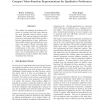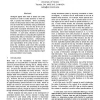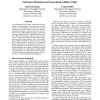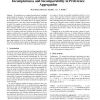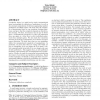80
Voted
UAI
2004
15 years 2 months ago
2004
We consider the challenge of preference elicitation in systems that help users discover the most desirable item(s) within a given database. Past work on preference elicitation foc...
91
Voted
IJCAI
2003
15 years 2 months ago
2003
Preference elicitation is a serious bottleneck in many decision support applications and agent specification tasks. CP-nets were designed to make the preference elicitation proces...
90
Voted
IJCAI
2003
15 years 2 months ago
2003
Intelligent agents often need to assess user utility functions in order to make decisions on their behalf, or predict their behavior. When uncertainty exists over the precise natu...
106
click to vote
AAAI
2006
15 years 2 months ago
2006
Any automated decision support software must tailor its actions or recommendations to the preferences of different users. Thus it requires some representation of user preferences ...
83
Voted
AAAI
2006
15 years 2 months ago
2006
Research on preference elicitation and reasoning typically focuses on preferences over single objects of interest. However, in a number of applications the "outcomes" of...
117
Voted
IJCAI
2007
15 years 2 months ago
2007
We consider how to combine the preferences of multiple agents despite the presence of incompleteness and incomparability in their preference orderings. An agent’s preference orde...
108
click to vote
AIA
2007
15 years 2 months ago
2007
The enormous number of questions needed to acquire a full preference model when the size of the outcome space is large forces us to work with partial models that approximate the u...
104
click to vote
ATAL
2008
Springer
15 years 2 months ago
2008
Springer
Complexity theory is a useful tool to study computational issues surrounding the elicitation of preferences, as well as the strategic manipulation of elections aggregating togethe...
ATAL
2008
Springer
15 years 2 months ago
2008
Springer
The ability for an agent to reason under uncertainty is crucial for many planning applications, since an agent rarely has access to complete, error-free information about its envi...
108
Voted
ICCBR
2003
Springer
15 years 5 months ago
2003
Springer
Abstract. Very often a planning problem can be formulated as a ranking problem: i.e. to find an order relation over a set of alternatives. The ranking of a finite set of alternat...
